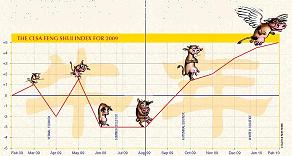Translation by Sim Kih

WE ROUTINELY recommend stock investments when interacting with readers.
Strangely enough, retail investors seldom achieve outstanding returns even with our sound recommendations. On hindsight, I recall readers did not take immediate action when we recommended Luk Fook (HK 590). Instead, they asked about Chow Sang Sang (HK: 116), King Fook (HK: 280) and Hang Ten Group (HK: 448).
Is a jewelry retail stock better, or a fashion retailer? They were looking to bet a few thousand bucks in the best sector, or even the best stock. But, no one was interested in Luk Fook’s fundamentals.
Indecisive trading habits can only result in three outcomes: loss of opportunity, loss of trading gains, or worse --- jumping into a stock only after it has surged, which means the stock is likely to tank as soon as it is purchased. These problems can be succinctly attributed to ‘late action’. It is not necessarily a good thing to do due diligence on a wide universe of stocks. Sometimes, excessive caution deteriorates into investment paralysis.
Let me illustrate investment paralysis with an anecdotal test done by psychologists: An elderly patient suffering from arthritis needed major surgery. However, being advanced in years, surgery for arthritis may prove to be too much of an ordeal for the patient. When offered the option of administering a drug as an alternative, almost half of doctors surveyed opted for the drug. However, when given the option of choosing between two drugs available on the market or surgery, the percentage of doctors opting for drugs fell to a quarter. When doctors had to make a choice between two drugs, three-quarters actually took the surgery option!
Availability of alternatives leads to indecisiveness, which in turn leads to irrational action.
A second illustration: When investors believe that holding stocks is preferable to holding cash, if the entire stock market comprises of only one stock, everyone will simply invest in that stock. However, when given dozens of stock picks, investors hesitate and may finally end up still holding cash.
Information overload and being spoilt for choice lead to investment paralysis. As I have said, believing that more information leads to better decision-making, most people have been stuck in a research rut. The solution is really to focus on only the critical information. My previous news commentary was on investment logic. Today, we’re talking about identifying critical information for long-term investments.
Critical information for long-term investments needs to be fresh. There are two aspects to this:

The first is information on new phenomenon. For example, the program for purchase of consumer electronics and cars by rural households in 2009 and the introduction of affordable mass housing last year caused prices of automotive and consumer electronics stocks and China State Construction (HK: 3311) to soar.
The second is a realization of the extent of impact that a well-known fact has on stock price. Such things usually take 6 to 12 months for the market to react to.
Example: the surge in retail sales during the first half of last year was so apparent, even the blind roaming retail malls would sense it. However, Hong Kong retail investors only came to realize this during the fourth quarter of last year, which was when retail stocks started flying. By that time, the retail stocks have already peaked. In other words, information is valueless by the time it is acted on by retail investors.
Why not take a leaf from the investment books of gurus like Germany’s Lenny Dykstra or Japan’s Kawa Ginkura, who rely on critical information to reap huge gains. Without keeping a close tab on current affairs such as real estate news, the retail scene, and spikes in office rentals, when will the retail investor ever get his moment of epiphany?
This article appeared in Quamnet in Cantonese. It has been translated by NextInsight and is republished with the kind permission of the author.

與讀者互動,推介股票,屬指定動作。自問眼光尚可,卻發現散戶讀者,收獲有限。回顧讀者答問,才發現原因:舉凡推介六福(0590),讀者第一時間,非伺機買入,反而是問:「周生生(0116)點睇?」「景福(0280)係咪抵啲?」想像力豐富的,更會聯想到漢登(0448):「珠寶股好啲,定係服裝股好啲?」審犯咁審,誓要無限比較,自我折服所買屬板塊最佳,甚至是天下第一股,方肯落注幾千銀。六福的基本因素,卻無人關心。
如此操作,結局有三:左諗右諗,原地打躉,坐失良機;左度右度,最終細搏,大勝變小贏;左揀右揀,買咗爛橙,爆升才買,落得一買即艇。上述問題的共通點,一字記之曰:「慢」。查實選擇越多,未必是好事,最終釀成「決策癱瘓」,動彈不得。
何謂決策癱瘓?以一例解釋。一次實驗中,心理學家設定情景:有一年老關節炎患者,需動大手術,基本上是「煎皮拆骨」,料其難以忍受。此際出現一種新藥,醫生會如何選擇?結果:近半受訪醫師會即試新藥,免老人動刀受苦。接下來才是戲肉:設同時出現兩種新藥,互有優劣,又如何?正路去想,應有更多醫師選擇用藥,可結果卻恰恰相反:僅四份一受訪醫師選用藥,四份三竟決定開刀算數!
選擇增加,往往令人無所適從。難以決定下,盡快投向最不理性之處,省卻苦惱,人性使然。譬如你認為買股優於揸現金,如市場只有一股,無需多講,都會入貨。但有幾十隻股票,各有千秋,反不能入手,最終所揀,可能是最差選擇:揸現金。
選擇太多外,資訊太多,也會導致「決策癱瘓」。正如之前在報章所寫:「一般人的錯覺,是資訊越多越好,所以經常陷入搜尋資訊的泥沼。」解決辦法:專注找出「關鍵資訊」所在。上次寫報紙,是針對投機思維,今次嘗試解釋如何篩選長線投資的關鍵資訊。
長線投資的關鍵資訊,務必為「新」。新,有兩義。新之第一義:「從無到有」,如09年家電下鄉、汽車下鄉、去年推行經濟適用房,後來汽車股、家電股以及中國建築(3311),股價大幅飆升,是為鮮明的例子。新之第二義:「恍然大悟」,事件早已存在,只是留意者稀,要半年、甚至一年,終達臨界點,才會忽然人人察覺,人人關心,人人認同。如2010年上半年,零售市道,已極暢旺,凡有行商場,盲都睇到,但要到第四季,全港散戶才恍然大悟,爭相認同,高位飛身搶入。股價拋物線飛升之際,也是開到荼靡之時。簡單而言,散戶皆知的資訊,價值近零。
德國股神科斯托蘭尼、日本股神是川銀藏,皆靠「關鍵資訊」獲取鉅利,不妨參考其著作偷師。現時報紙地產版中,商場、寫作樓租金飛升的新聞,不知凡幾,散戶何時方「恍然大悟」?




